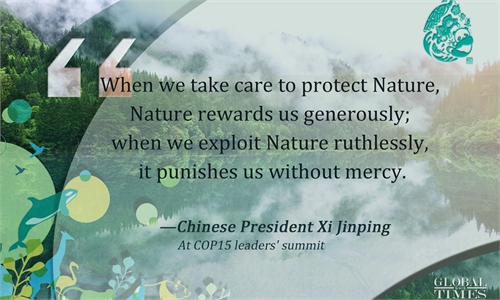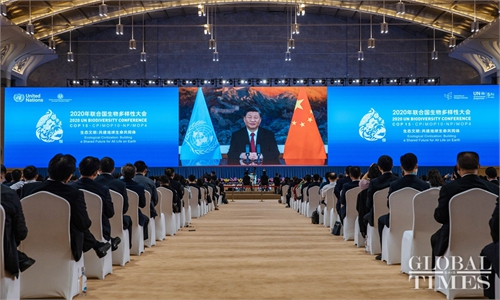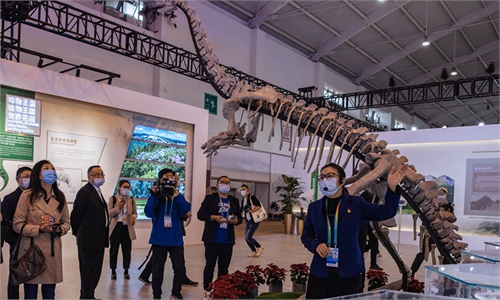China pledges $233m for biodiversity fund, ‘won't bow to external pressure on domestic goals’
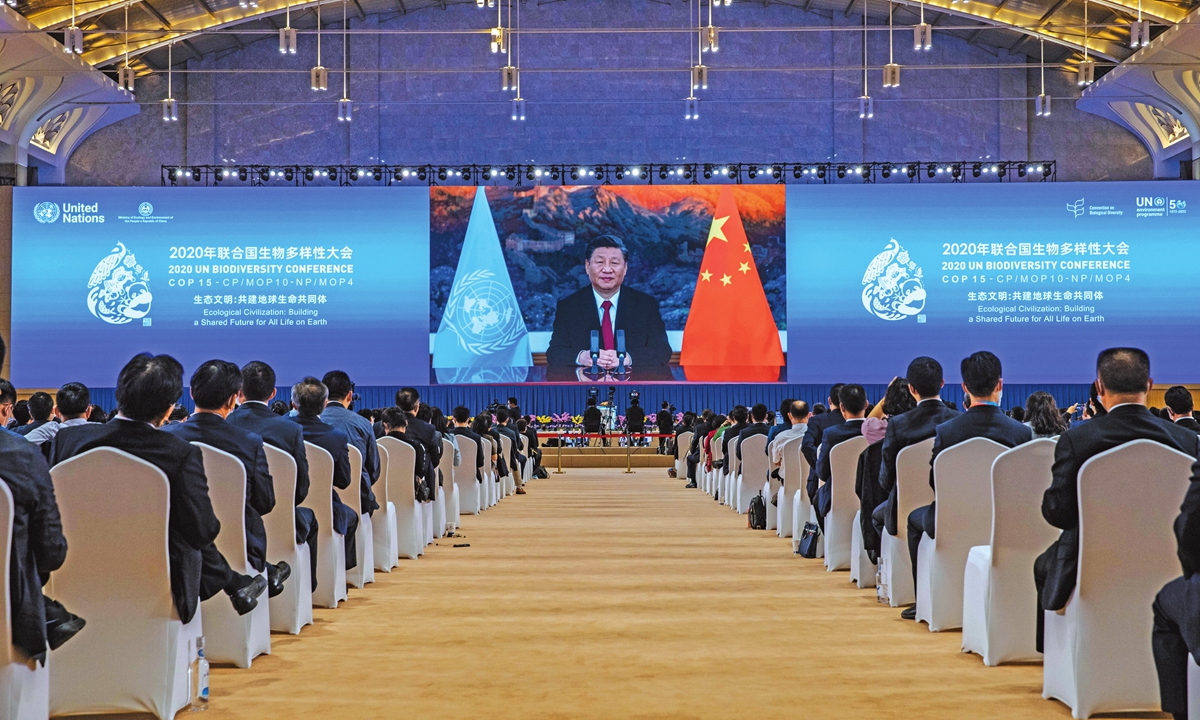
Chinese President Xi Jinping speaks at the leaders' summit of the 15th meeting of the Conference of the Parties to the Convention on Biological Diversity (COP15) on Tuesday via video link in Beijing. Photo: Li Hao/GT
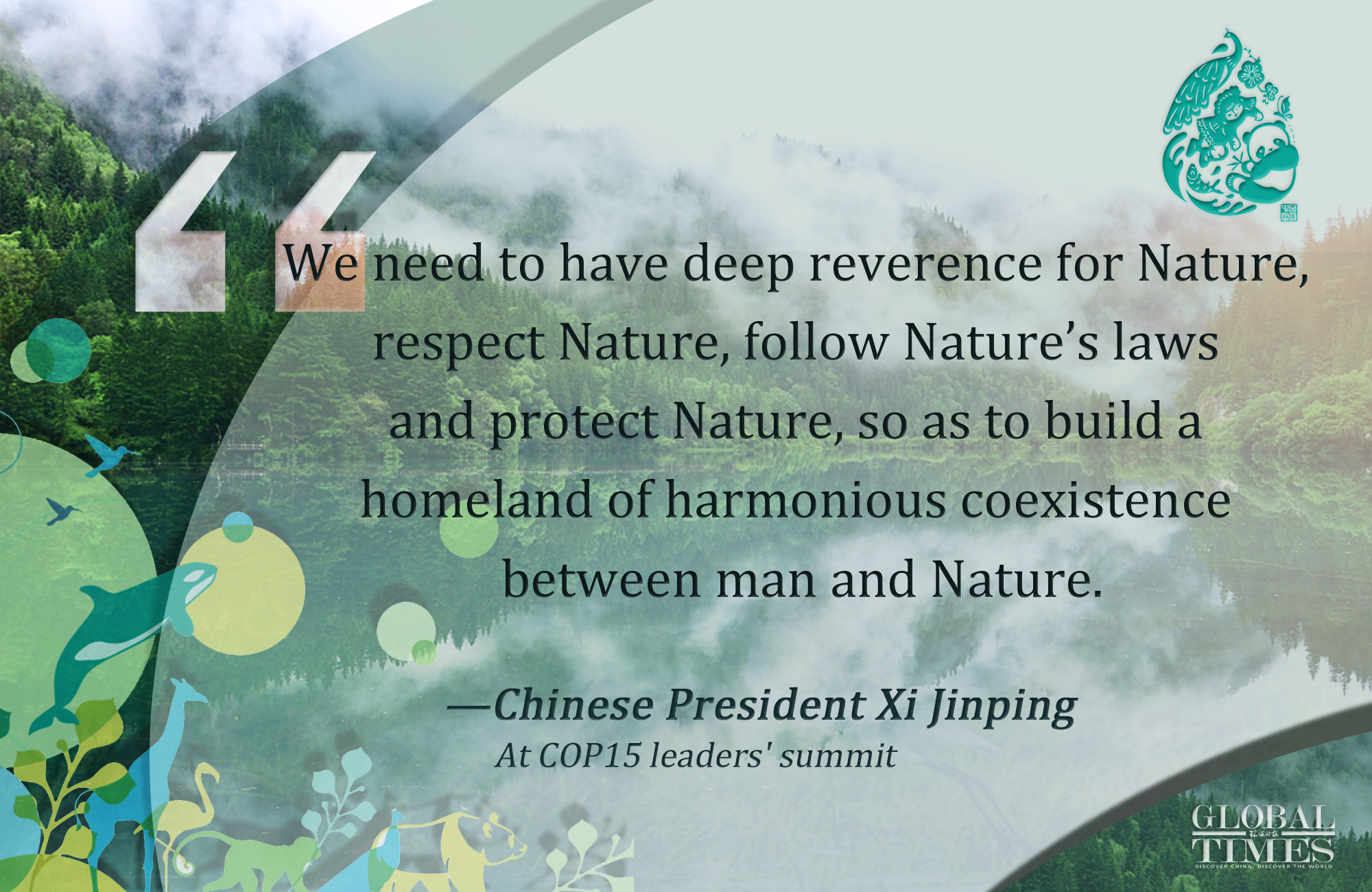
Highlights of Xi' speech at COP15 leaders' summit Graphic: Yu Tianjiao/GT
China vowed to strengthen its own biodiversity protection and release implementation plans for peaking carbon dioxide emissions while investing 1.5 billion yuan ($233 million) to support biodiversity protection in developing countries at the biggest biodiversity conference in a decade on Tuesday.
At a critical moment for mapping out the next 10 years' biodiversity targets, analysts said China's contribution and ecological progress will help the world better achieve the new targets, and the Chinese ecological concept was a great idea that the world needs badly. Meanwhile, Chinese analysts said China will not bow to external pressure in reaching its carbon emission goals despite the West's pressure and malicious attacks on ideology.
President Xi Jinping on Tuesday announced China's initiative to establish a Kunming Biodiversity Fund and take the lead by investing 1.5 billion yuan ($233 million) to support biodiversity protection in developing countries.
Xi made the remarks while addressing the leaders' summit of the 15th meeting of the Conference of the Parties to the Convention on Biological Diversity (COP15) via video link in Beijing.
To strengthen its own biodiversity protection, China is moving faster to establish a protected areas system with national parks as the mainstay, Xi said.
China has officially designated its first group of national parks that includes the Three-River-Source National Park, the Giant Panda National Park, the Northeast China Tiger and Leopard National Park, the Hainan Tropical Forests National Park, and the Wuyishan National Park, Xi said.
The protected land area is 230,000 square kilometers and they cover nearly 30 percent of the key terrestrial wildlife species found in China, the President said.
In addition, China has started building a system of national botanical gardens in places like Beijing and Guangzhou, he said.
To achieve its carbon peaking and neutrality targets, Xi said China will release implementation plans to peak emissions in key areas and sectors as well as a series of supporting measures, and will put in place a "1+N" policy framework for carbon peaking and carbon neutrality, where "1" refers to the policy and "N" to the support measures.
China will continue to readjust its industrial structure and energy mix, vigorously develop renewable energy, and make faster progress in planning and developing large wind power and photovoltaic bases in sandy areas, rocky areas and deserts. The first phase of projects with an installed capacity of approximately 100 million kilowatts has recently started construction in a smooth fashion, Xi said.
He also called on the international community to enhance cooperation, build consensus and pool strength to build a community of all life on Earth.
World leaders including Russian President Vladimir Putin, French President Emmanuel Macron and UN Secretary General António Guterres delivered remarks via video.
Xi's important speech pointed out the goals and direction for future global biodiversity governance, Zhao Lijian, spokesperson of Chinese Foreign Ministry, said at Tuesday's media briefing.
Xi said that we need to practice true multilateralism, and effectively honor and implement international rules, which are not to be exploited or discarded at one's own will.
Professor Shahbaz Khan, Director and UNESCO Representative to China, the Democratic People's Republic of Korea, Japan, Mongolia and the Republic of Korea told the Global Times on Tuesday that China is the country which is promoting multilateralism, supporting the UN system, helping all the other countries which need support on biodiversity, not just bilaterally, but multilaterally through mechanisms such as the South-South Cooperation and Shanghai Cooperation Organization.
He said that he is looking forward to the leadership of China in making ecological civilization a reality for the world.
Li Junfeng, former director general of China's National Center of Climate Change Strategy Research under the National Development and Reform Commission told the Global Times that Xi's speech is a signal to urge institutes to come up with relevant policies on reducing carbon emissions domestically, while the 1.5 billion yuan in funding is just a start for China's contribution to global biodiversity protection.
Answering criticisms from Western media and politicians that China is not accelerating its pace on reaching carbon emission targets, Li said that China is well placed to realize its current goals, which is designed in accordance with the country's economic development and energy status quo, and it will not bow to any external pressure.
China would not bring forward new goals immediately, but China will gradually detail its existing goals, such as the coal industry reaching the carbon emissions peak earlier, said Li, noting China's emphasis now is how to realize such goals.
He said that the 1.5 billion yuan in funding is a start for China's contribution to adapting to and mitigating climate change and protecting biodiversity, and it will ratchet up such efforts in the near future. "As we made huge strides from being an impoverished developing country to a high-income developing country, China is also stepping up contributions in those areas for international society."
China stresses the importance of building national parks, which have three functions, one to preserve biodiversity, as it provides natural inhabits to botanic and animal species, and they help improve the environment and increase the coverage of forest carbon sinks, analysts said.
High-level sessions on Tuesday and Wednesday include a leaders' summit and a ministerial segment plenary, and the aim is to ensure political momentum in support of the ongoing negotiations to develop an effective post-2020 global biodiversity framework that will be adopted at the second part of COP15 in 2022. The Kunming Declaration is expected to be adopted on Wednesday at the final session.
Great concept has no boundaries
Themed "Ecological Civilization: Building a Shared Future for All Life on Earth," the ongoing meeting is the first global conference convened by the UN on the topic of ecological civilization.
The Kunming Declaration is expected to be adopted on Wednesday, which is expected to stress building of an "Ecological Civilization," where nature is respected, "lucid waters and lush mountains" and all ecosystems are recognized and protected as invaluable assets, according to the draft of the Kunming Declaration Towards an Ecological Civilization: Building a Shared Future for All Life on Earth on the UN website.
"Lucid waters and lush mountains are invaluable assets," are oft-quoted words by Xi which have been a key component of his thoughts on ecological civilization.
Some Western media either turned a blind eye to the COP15 meeting or reported it through a biased lens. A Reuters report claimed that China will urge countries to endorse "key Chinese Communist Party slogans about protecting natural ecosystems," as the Kunming Declaration is expected to include Chinese concepts.
Khan told the Global Times there are no boundaries in terms of bringing good ideas or concepts to the world which are needed. The world needs good ideas more than ever before.
When China hosted global summits such as the Extended 44th session of the World Heritage Committee, China did not "dictate anything" and all nations worked together and developed a consensus, Khan said.
Signe Brudeset, Norwegian Ambassador to China, told the Global Times on Tuesday that China has done a lot, for example, on planting trees and her country is quite curious in learning more about the ecological "red lines" program.
China's ecological conservation "red line" program identifies the country's crucial ecological zones and enforces strict protection in those areas.
"This is something that we would like to know more about and study further," Brudeset said.



